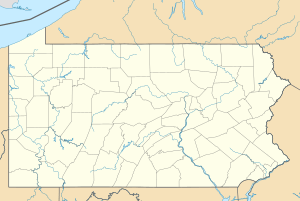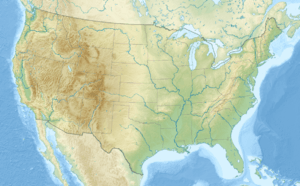McKinney Run (Brokenstraw Creek tributary) facts for kids
Quick facts for kids McKinney Run |
|
|---|---|
|
Location of McKinney Run mouth
|
|
| Other name(s) | Tributary to Brokenstraw Creek |
| Country | United States |
| State | Pennsylvania |
| County | Warren |
| Physical characteristics | |
| Main source | divide between McKinney Run, Indian Camp Run and Irvine Run about 2 miles northwest of Irvine, Pennsylvania 1,605 ft (489 m) 41°52′12″N 079°17′28″W / 41.87000°N 79.29111°W |
| River mouth | Brokenstraw Creek Irvine, Pennsylvania 1,161 ft (354 m) 41°50′47″N 079°16′47″W / 41.84639°N 79.27972°W |
| Length | 1.79 mi (2.88 km) |
| Basin features | |
| Progression | south |
| River system | Allegheny River |
| Basin size | 0.89 square miles (2.3 km2) |
| Tributaries |
|
| Bridges | US 6 |
McKinney Run is a small stream, also called a "run," located in Pennsylvania, United States. It is about 1.79 mi (2.88 km) long. This stream is a tributary to Brokenstraw Creek, which means it's a smaller stream that flows into a larger one. Environmental experts classify McKinney Run as a "1st order stream." This means it's one of the smallest types of streams, and no other smaller streams flow into it.
Contents
Where Does McKinney Run Start and End?
The Course of the Stream
McKinney Run begins in Warren County, Pennsylvania. Its source is about 2 miles northwest of a town called Irvine, Pennsylvania.
From its starting point, McKinney Run flows generally south. It continues its journey until it reaches and joins Brokenstraw Creek. This meeting point is right in the town of Irvine, Pennsylvania.
What is a Watershed?
The Land Around McKinney Run
Every stream or river has a watershed. A watershed is all the land area that drains water into that specific stream. For McKinney Run, its watershed covers about 0.89 square miles (2.3 km2). This area is part of a larger region known as the Pennsylvania High Plateau.
The land in McKinney Run's watershed gets a good amount of rain and snow. On average, it receives about 44.5 inches of precipitation each year. This area is quite wet, which helps keep the stream flowing.
Most of the land in this watershed is covered by trees. About 87% of the area is forested. This is important because forests help keep the water clean and provide homes for many animals.
 | Janet Taylor Pickett |
 | Synthia Saint James |
 | Howardena Pindell |
 | Faith Ringgold |



